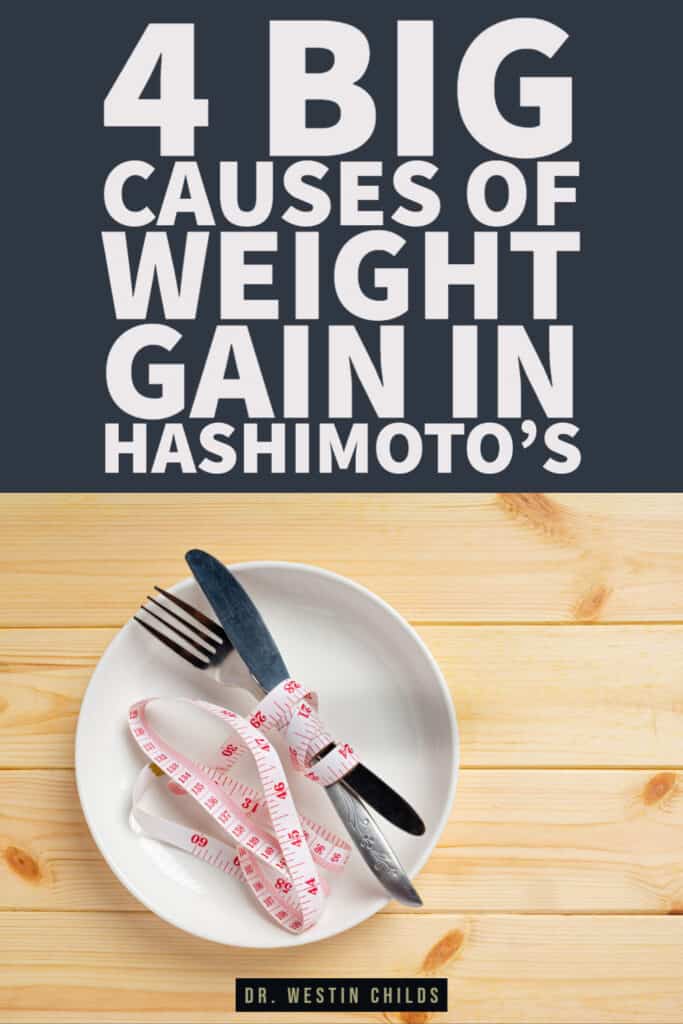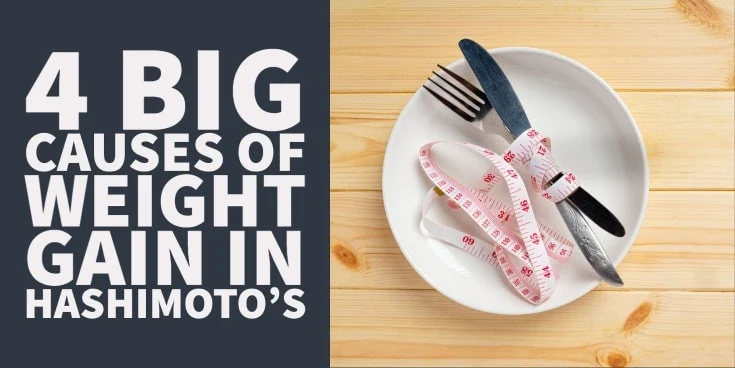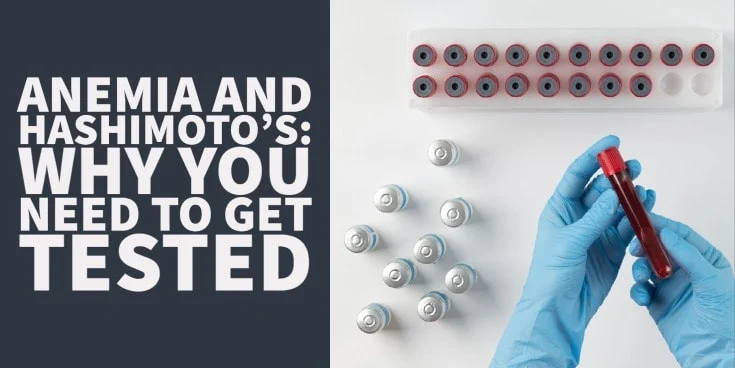If you have Hashimoto’s and you are gaining weight then stopping this weight gain should be your top priority.
I’m not kidding when I say that weight gain in thyroid patients can cause a lot of distress.
From the impact that it has on your psychological well-being (1) to the impact it has on your overall health (2), managing your weight is very important.

More so for patients who have Hashimoto’s thyroiditis.
Why?
Because losing weight and keeping it off is harder for patients who have thyroid problems.
Losing weight is also more difficult if you are a woman (3). And because Hashimoto’s impacts women (4) more than men, you have two things going against you.

But there is some good news:
Gaining weight with Hashimoto’s is not some inevitable thing that has to happen.
And, even if has already happened to you, doesn’t mean that you can’t stop it or even lose the weight that you’ve gained from your diagnosis.
The key is all about understanding the underlying cause of weight gain if you have a thyroid problem.
Contrary to popular belief, it’s not just about your calories or your diet (though these can play a role).
It’s a little bit more complicated which is why we are going to be discussing it today.
In this article, you will learn:
- How Hashimoto’s impacts your thyroid and why that results in weight gain.
- How inflammation contributes to weight gain and how to stop it.
- How your thyroid impacts your sex hormones and how they impact your weight.
- How subtle changes to your mood and brain can impact your willpower and ability to stay on track with your diet and lifestyle.
- How thyroid fatigue impacts your weight and ability to exercise and burn calories.
- Frequently asked weight loss questions about Hashimoto’s
- And much more
Let’s jump in…
DOWNLOAD FREE RESOURCES
Foods to Avoid if you Have Thyroid Problems:
I’ve found that these 10 foods cause the most problems for thyroid patients. Learn which foods you should avoid if you have thyroid disease of any type.
The Complete List of Thyroid Lab tests:
The list includes optimal ranges, normal ranges, and the complete list of tests you need to diagnose and manage thyroid disease correctly!
4 Reasons You Are Gaining Weight
If you were hoping to learn more about how to cut calories to help you lose weight then you’ve come to the wrong place.
Calorie restriction may be the preferred method for weight loss by endocrinologists, nutritionists, and some researchers, but it’s not really going to help you much as a patient with Hashimoto’s.
Having a thyroid problem changes everything.
Your ability to manage your weight is more about hormone balance than anything else.
The sooner you come to this realization the better.
Yes, calories are important and, yes, they do play a role, but their role is minor to the things we are about to discuss.
Calorie-restricted diets, such as those promoted by major weight loss brands and companies, can actually cause more harm than good for your thyroid.
Just a few short weeks of cutting your calories on a daily basis are enough to slow down your thyroid, lower T3 (5), increase reverse T3 (6), and slow down your metabolism (7).

You’ll want to avoid this type of diet at all costs.
Instead, focus on these 4 major causes of weight gain:
#1. Low Thyroid Function from Thyroid Gland Damage
The first and most obvious source of weight gain among patients with Hashimoto’s is that of thyroid function.
In order to understand this connection, you have to understand the importance of thyroid hormone as it relates to your metabolism.
Your metabolism, or basal metabolic rate, represents the number of calories that you burn on basic day-to-day functions.
Ranging from things like eating to thinking to breathing, these calories are necessary for keeping you alive.
Your thyroid helps to regulate this number by impacting things like your heart rate, how much cellular energy you produce, and how much heat your body produces.
Patients with low thyroid function see a decline in their basal metabolic rate (8) which results in several things:
- A decrease in their resting heart rate
- A decrease in their body temperature
- Weight gain due to a decrease in whole-body metabolism
Just think about this for a minute:
If you are gaining weight because your metabolism has dropped, do you think that lowering your calories will solve that problem?
Or does it make sense to focus on the root cause of the problem and bring your thyroid back to its normal function?
The answer is obvious.
Spend your time and energy on INCREASING your thyroid function back to whatever its normal was before you developed Hashimoto’s.
This is the single best and most important action you can take if you have Hashimoto’s and you are experiencing weight gain.
How can you do that?
The easiest way is to simply take thyroid medication.
Thyroid medication will immediately boost up your thyroid function and, as long as it is dosed correctly, will bring you to normal very quickly.
You don’t necessarily have to use medication, though, if you don’t want to.
If you are in early-stage Hashimoto’s and in a sub-clinical hypothyroid state, you may be able to see improvement by using natural therapies.
Treatments like changing your diet, regular exercise, stress reduction, getting enough sleep, and replacing nutrient deficiencies can sometimes be enough to improve your thyroid naturally.
It doesn’t matter how you get there, just be sure you are focusing on your thyroid function.
#2. Inflammation in Your Body from Immune Dysregulation
Another cause of weight in Hashimoto’s has to do with inflammation.
Inflammation is not necessarily a bad thing on its own but it can become bad if it becomes rampant or chronic.
Inflammation is the process by which your body fights off infections and helps your body repair damaged tissues.
In this sense it’s good.
But it can become a problem when it’s not properly managed by the body, when it’s found in places it shouldn’t be, or when it goes on for long periods of time.
And this is exactly what happens in patients with Hashimotos.
Because Hashimoto’s is primarily an autoimmune disease, inflammation is a core component of the disease.
It is inflammation that results in thyroid gland damage and the recruitment of white blood cells (9) into your thyroid gland.
And, over time, this inflammation of the thyroid gland may cause irreversible thyroid gland damage making you 100% reliant on thyroid medication for the rest of your life.
Systemic inflammation also has a negative impact on other systems in your body including other fat-regulating hormones like insulin and leptin.
Insulin resistance and leptin resistance are both made worse in the face of inflammation.
Inflammation and your thyroid make weight gain worse in a vicious cycle.

Excess weight gain results in the release of cytokines and chemokines (10) which in turn may make thyroid function worse.
The worse your thyroid function gets the easier it is for you to gain weight.
And the cycle repeats.
Cooling down inflammation is an important way to stop this cycle to not only prevent further weight gain but to also slow down or stop the attack of your own immune system on your thyroid gland.
When it comes to managing inflammation in Hashimoto’s, one of the best things you can do is simply avoid those things that trigger inflammation or make it worse.
Things like eating inflammatory foods and oils, exposing yourself to too much stress, not getting enough sleep, exposure to environmental chemicals (11) or toxins, and chronic infections, can all contribute to low-grade inflammation.
The key to stopping this inflammation isn’t to take something like an anti-inflammatory medication but instead to stop the root cause of the inflammation.
#3. Sex Hormone Imbalances in Estrogen and Progesterone From Thyroid Dysfunction
Next up we have sex hormone imbalances.
As a patient with Hashimoto’s, you are probably well familiar with the impact that your thyroid has on your weight.
But what you may not realize is that there are other hormones that also contribute to your weight and these hormones can be dragged down by your thyroid.
Here’s an example:
One common symptom of hypothyroidism (caused by Hashimoto’s) is infertility.
The inability to conceive is a complex problem but, in the case of thyroid disease, stems from the impact that thyroid dysfunction has on progesterone, estrogen, and ovulation.
Thyroid dysfunction results in anovulatory cycles (12) and disordered levels of both estrogen and progesterone.

The result? It’s much harder for your body to get pregnant.
You might be thinking, what does infertility have to do with my weight?
A lot, actually!
Sex hormones such as estrogen and progesterone are hormones that can impact your fat cells.
During puberty, these levels rise which causes weight gain in certain areas of the female body to accentuate the female figure.
In menopause, it is the decline in these hormones that results in weight gain, vasomotor symptoms, bone loss, and so on.
In other words, these hormones impact how and where your body stores fat.
If your thyroid is dysfunctional then you may start to see changes in these sex hormones.
The more disordered your progesterone and estrogen become, the more likely you are to gain stubborn fat in specific areas of your body.
Excess weight gain in the hips, thighs, and butt region can all stem from sex hormone imbalances.
#4. Changes to your Appetite from Your Mood and Depression
We all know how important diet is when it comes to managing weight.
Whether you believe that calories are responsible for weight or whether you believe that it’s more about the quality of the food you eat that influences your weight, diet is still important.
Patients with Hashimoto’s have a special struggle in this area that other people don’t.
They have to deal with the ups and downs, mood changes, and depression that stem from thyroid disease.
It’s not exactly known why Hashimoto’s causes these symptoms but one theory is that they are caused by neural inflammation (13).

Regardless of their cause, they exist and they can easily lead to weight gain.
We know that if someone is depressed it’s harder to make good decisions about their diet.
It’s a lot easier to eat unhealthy foods when you are feeling down because your willpower is sapped.
Depression and mood changes don’t hit every patient with Hashimoto’s but you should be prepared in case it hits you.
Be aware of your mood, how it impacts your dietary choices, and how these choices can impact your ability to lose weight.
Treating your thyroid and managing inflammation can go a long way to keeping you from experiencing depressive symptoms.
Hashimoto’s Weight Loss Frequently Asked Questions:
Because weight loss is so important to many patients with Hashimoto’s, I frequently get a lot of questions on this topic.
Below I’ve included the most frequently asked questions and their answers.
If you have additional questions that aren’t answered here please leave your comment below and I will continually add them to this list!
#1. How Much Weight Can You Gain with Hashimoto’s?
I wish I could say there is some magical number and that it will stop but that’s not the case.
Weight gain varies from person to person and it largely depends on the severity of your disease.
The worse your Hashimoto’s and the lower your thyroid function, the more weight you will gain.
On average, most women who develop Hashimoto’s gain somewhere between 20 and 30 pounds from their thyroid.
This initial weight gain stems from the thyroid but can then spiral as other problems start to stack on top of each other.
Initial weight gain can limit your ability to exercise which causes more weight gain.
This extra weight may result in hormone imbalances to important hormones such as insulin and leptin which may trigger more weight gain and so on.
This type of vicious cycle is typically what causes weight gain in excess of 50 pounds or more in some Hashimoto’s patients.
For this reason, it is very important that you do whatever it takes to manage your weight before it gets worse!
The more overweight you are and the longer you’ve been overweight the more difficult it will be to get back to normal.
#2. How Long Does it Take To Lose Weight if you have Hashimoto’s?
It really depends on the person!
Hashimoto’s is a dynamic disease which means that it impacts each person a little bit differently.
As a result, it’s hard to predict how long or how difficult it will be to lose weight for any given person.
In general, the worse your Hashimoto’s and the more impact it has on thyroid function, the longer it will take you to lose weight.
Even though I can’t give you an exact answer, I can give you some general information.
Assuming you are on the right treatment (which may include thyroid medication) and once you’ve dialed in your diet, exercise routine, and so on, you should start to see your weight normalize within about 4-8 weeks.
From there, you will most likely see a steady decline in your weight of about 2-10 pounds per month until you reach your normal body weight.
For most thyroid patients this process will take on the order of 6 to 12 months but I’ve seen it take as long as 2 years in some cases.
When it comes to your thyroid and your weight, it’s a slow process so prepare accordingly.
This isn’t a bad thing, though, because once you lose weight the right way it will stay off for good!
Embrace the slower consistent weight gain and it will pay you back in dividends for years to come.
#3. How Hard is it to Lose Weight with Hashimoto’s?
Unfortunately, it’s a lot more difficult for someone with Hashimoto’s to lose weight compared to someone who doesn’t have a thyroid problem.
I always tell thyroid patients that it will take them about twice as long as someone who doesn’t have a thyroid problem to lose the same amount of weight.
So if someone without a thyroid problem can lose 10 pounds, you should expect to lose 5 pounds.
If it takes someone 1 month to lose 10 pounds then you should expect it to take you 2 months instead of one.
Weight loss is also a little slower if you are a woman as opposed to a man.
It’s roughly two to three times harder for women to lose the same weight as a man in the same time period.
This is just a general estimate, though, so don’t take it as the gospel truth.
There are some thyroid patients who are able to manage their weight much easier than other thyroid patients but this is not the norm.
Due to how Hashimoto’s impacts your metabolism and due to how difficult it is to get on the right treatment, you should expect weight loss to be fairly difficult.
#4. Will Thyroid Medication Help Me Finally Lose Weight?
Yes, no, and maybe.
It is definitely the hope that thyroid medication will help patients with Hashimoto’s lose weight but that isn’t always the case.
Here’s why:
The most commonly prescribed thyroid medication, levothyroxine, contains one of the least powerful thyroid hormones known as T4.
T4 is not active by itself and must be converted into T3 in order to act on your cells and do its job.
T3 is the thyroid hormone responsible for increasing your metabolism, raising your body temperature, and helping you lose weight.
So if you are someone who has been given T4 in the form of levothyroxine but your body can’t activate it or convert it then weight loss will be very difficult.
What can you do to solve this problem?
You can take a combination thyroid medication that includes both T4 and T3 thyroid hormones.
You can even build on this idea further by adding in T2 thyroid hormone which is the only thyroid hormone available over the counter.
From a weight loss perspective, T3 and T2 thyroid hormones are far more powerful and more effective than T4 but that doesn’t mean you should neglect T4.

Balancing all three of these hormones is important because that’s how the healthy thyroid gland operates.
T3 thyroid hormone can be prescribed by your doctor under the name Cytomel or liothyronine and that medication can be taken along with your prescription of levothyroxine.
T2 thyroid hormone can be purchased as an over-the-counter supplement and added to your T4 and T3 regimen.
This strategy allows you to take T4, T3, and T2 thyroid hormones at the same time and gives your body more of the thyroid hormones that actually helps you lose weight.
It gets even more complicated when you realize that the amount of T4 and T3 that you take needs to be individualized for the person.
For instance, someone with Hashimoto’s may be fine using 100mcg of T4 and 10mcg of T3.
On the other hand, another patient with Hashimoto’s may need 80mcg of T4 and 20mcg of T3.
This balancing of T4 and T3 should be done on an individual basis to figure out what that person does best on.
In order to arrive at your optimal dose, you will need thyroid lab tests beyond just the TSH.
You will need to look at your free thyroid hormone levels including free T3, free T4, and reverse T3.
Once you are on the right medication for your body you can then expect your thyroid medication to help you lose weight.
#5. Does Hashimoto’s Cause Belly Fat?
Yes! Hashimoto’s can absolutely cause belly fat but it can also cause you to gain weight elsewhere on your body.
You may or may not be aware but the location where you gain weight on your body can tell you a lot about your hormones.
Belly fat, for instance, is usually caused by an increase in cortisol or insulin.
Low thyroid disease (such as that seen in Hashimoto’s) typically causes weight gain over the entire body in an equal fashion.
So if you’ve gained weight just about everywhere including your arms, thighs, back, belly, and butt, then it’s most likely from your thyroid.
But because thyroid hormone has an influence on both cortisol and insulin, it’s possible that Hashimoto’s may also result in belly fat.
The key to losing belly fat if you have Hashimoto’s is all about treating your thyroid first and then picking up any leftover hormone imbalances afterward.
When you optimize your thyroid you should see your metabolism improve which will naturally reduce your weight.
If you still notice you have belly fat after optimizing your thyroid then you can look into other hormone imbalances such as insulin resistance or excess cortisol levels.
#6. How do I know my Thyroid is Causing my Weight Gain?
It’s actually more difficult than you might think!
It is well known in the scientific literature that low thyroid function results in weight gain but, for whatever reason, doctors will look to blame just about anything else except your thyroid.
To some degree, they are on the right track but their approach is still misguided.
They are partially on the right track because the truth is that there are many conditions that can contribute to weight gain aside from your thyroid.
Before you blame your thyroid, you will want to make sure that these other factors are not contributing.
For instance, you can’t blame your thyroid for weight gain if you are sleeping 4 hours per night.
You can’t blame your thyroid for your weight if you are eating an unhealthy diet, going through menopause, avoiding exercise, stressed out of your mind, and so on.
All of these factors can and will have an impact on your weight.
One of the easiest ways to check if your thyroid is contributing to your weight gain is by excluding these other factors.
If you notice that you’ve suddenly gained 10-20 pounds out of the blue, without changing your diet or exercise pattern, AND you are experiencing the symptoms of low thyroid, then there’s a very high chance your weight gain is from your thyroid and not something else.
#7. Is Intermittent Fasting Good for Hashimoto’s?
It can be!
There’s a big controversy going on about intermittent fasting and how it may help with weight loss.
On one hand, some people believe that it only helps because you are being forced into a state of caloric restriction.
On the other, some people believe that there is something uniquely beneficial to hormones like insulin when you avoid eating for a set period of time.
I happen to believe that fasting has benefits outside of its impact on calorie consumption which is why I believe it can be a very useful tool for thyroid patients.
But even if it doesn’t and it turns out that it’s only beneficial because it reduces your calorie intake, it still helps!
As long as you don’t over-fast (push your body into a state where it triggers an adaptive starvation mode) then fasting is a safe and effective therapy for most thyroid patients.
As always, be sure to keep your individual circumstances in mind when considering whether to fast or not.
While it is beneficial for many people it can cause problems for others.
Final Thoughts
Hopefully, you now have a better understanding of what leads to weight gain in Hashimoto’s.
It’s not quite as straightforward as “You ate too many calories”.
The truth is that most patients with thyroid disease gain weight without changing their diet or exercise routine because of the impact that the thyroid has on metabolism and other hormone systems in the body.
And it is these hormone systems that must be regulated and balanced if you want long-lasting weight loss.
Now I want to hear from you:
Do you have Hashimoto’s and are you gaining weight?
Do you know the cause of your weight gain?
Are you having any luck in improving your thyroid and metabolism?
Do you feel that you have other hormone imbalances contributing to your weight?
Leave your questions or comments below!
Scientific References
#1. ncbi.nlm.nih.gov/pmc/articles/PMC6052856/
#2. ncbi.nlm.nih.gov/pmc/articles/PMC4386197/
#3. ncbi.nlm.nih.gov/pmc/articles/PMC6282840/
#4. pubmed.ncbi.nlm.nih.gov/24793874/
#5. pubmed.ncbi.nlm.nih.gov/16720655/
#6. pubmed.ncbi.nlm.nih.gov/1249190/
#7. ncbi.nlm.nih.gov/pmc/articles/PMC5886711/
#8. ncbi.nlm.nih.gov/pmc/articles/PMC4044302/
#9. ncbi.nlm.nih.gov/books/NBK459262/
#10. ncbi.nlm.nih.gov/pmc/articles/PMC1483173/
#11. ncbi.nlm.nih.gov/pmc/articles/PMC2790188/
#12. ncbi.nlm.nih.gov/pmc/articles/PMC4724596/
#13. pubmed.ncbi.nlm.nih.gov/30373627/








